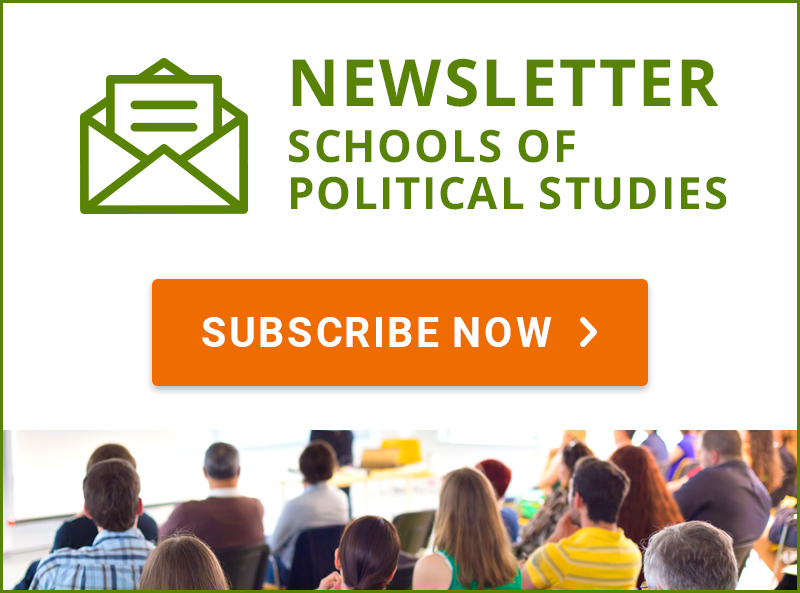Strategy Tools
European democracies today are exposed to a complex blend of threats. Extremism and populism are on the rise. Across our member States many people are facing economic hardship and trust in political institutions is at a low. It is now more than ever important to reinforce democratic societies based on a political culture marked by pluralism, tolerance and dialogue.
In this context our efforts to strengthen democratic security are vital.The Schools of Political Studies have proven themselves to be reliable and effective partners for the Council of Europe and they provide significant means to foster Europe’s response to these challenges. A strategic vision could help them better contribute to this response and increase their impact.
 Developing the Alumni network
Developing the Alumni network
Each year, a new cohort of school participants joins the growing body of Alumni, now numbering several thousands. Many of them occupy high positions in politics, state administration, media, business, and civil society, either in their own countries or internationally. A number of initiatives have been taken to involve Alumni in Schools’ activities: international Alumni seminars in 2014 and 2015 and the Civic Roundtables in 2016 and 2017. Alumni are regularly invited to Schools’ seminars and events. On the communication side, a column is regularly dedicated to the Alumni on the Schools Newsletter and on the Schools’ Association web site.
Efforts will be continued to mainstream Alumni’s contribution into the activities of the Council of Europe.
 Fostering Peer-support activities & Diversifying partnerships
Fostering Peer-support activities & Diversifying partnerships
The current economic climate means that it is not easy to mobilise funding in addition to the core funding provided by the Council of Europe. If the Schools are to continue providing quality training, as well as develop new activities and build links with other Schools, they need to develop new partnerships.
Increasingly, the Schools create stronger mutual links between them. They organise Peer-to-peer exchange, notably between more experienced Schools and newly established ones.
 Networking & Extension of network
Networking & Extension of network
The networking dimension of the Schools of Political Studies is a genuine asset. About 600 participants each year in more than 20 countries and thousands of alumni over the years play a role of active multipliers in the dissemination of standards and practices developed by the Council of Europe in their countries. This kind of engagement helps strengthen the Schools themselves by broadening their participation in public debate on policy options, thereby enhancing their visibility within their own country.
By establishing in 2008 the European Association of the Schools of Political Studies of the Council of Europe, the Network is able to communicate with a voice of its own. The Association plays an important role in fostering and maintaining the network of School Alumni.
The Schools provide a model for education, training, co-operation and exchange of knowledge which is just as appropriate for long-standing Council of Europe member states. With this in mind, an effort is made to consolidate and expand the network of Schools. Pilot seminars with a view to establishing a bi-communal School in Cyprus have been held in 2015 and 2016. An interest to join the Network has also been expressed by an organisation in Slovenia.Two seminars were also organised in Bishkek (Kyrgyz Republic) in 2017 in view of the possible creation of a School of Political Studies in Kyrgyzstan . The creation of an additional School in the longer term, in the Middle East, is also being explored.
 Mainstreaming Schools’ activities into Council of Europe’s activities
Mainstreaming Schools’ activities into Council of Europe’s activities
Taking account of the major challenges facing our societies, the Schools’ curricula are constantly evolving. By way of example, an increasing number of events are devoted to issues such as employment, climate change, good governance, employment, training of leadership skills, electoral campaigns, local government, capacity-building, democratic citizenship, public policies, mass media and society.
 Quality and Impact Assessment Manual - J. Popov, 2013
Quality and Impact Assessment Manual - J. Popov, 2013
"The positive impact of the training provided by the Schools on public affairs at all levels of governance is widely recognised. However, the procedures for assessing the quality and impact of the training dispensed by the Schools vary from School to School and have not yet been assessed in a consistent manner. The Quality and impact assessment manual for the Schools of Political Studies responds to this lack and intends to put in place systematic quality assessment procedures which could be used by all Schools."




